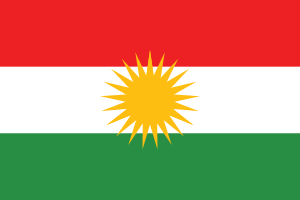Kurds in Georgia
 | |
| Total population | |
|---|---|
|
20,843 (2002 census).[1][2] 0.48% | |
| Regions with significant populations | |
| Batumi, Meskheti, Javakheti, Adjara,[1] Rustavi,[3] and Abkhazia.[4] | |
| Languages | |
| Kurdish,[5] Georgian | |
| Religion | |
|
Shia Islam[5] Irreligious[5] Yazidi[5] |
In the 20th century, most Kurds fled religious persecution in the Ottoman Empire to the Russian Empire.[6] In Georgia, Kurds enjoy a higher standard of living than the Kurds in Turkey and the Kurds in Iran and they face no discrimination in Georgia,[5] but the return of their Kurdish surnames needs efforts, says Kurdish activist in Georgia.[7] The Kurds also have their own schools, school books and a printing press in Georgia. Illiteracy among them disappeared in the early 1900s.[5] According to a United Nations High Commissioner for Refugees report from 1998, about 80% of the Kurdish population in Georgia are Yazidi Kurds.[3] Kurds in Georgia are politically neutral, however in 1999, they staged a huge demonstration in Tbilisi, demanding the release of the founder of Kurdistan Workers' Party, Abdullah Ocalan.[8] Kurds in Georgia use Cyrillic script. Earlier in the 1920s, they used the Latin script.[9]
History
The first Kurds came to Georgia, during the reign of George III in the 12th century.[10] Kurdish tribes appeared in Georgia in the 16th century, in the city of Mtskheta. During the 18th century Kurds arrived to Tbilisi, to get assistance from King Erekle II of the Kingdom of Kakheti during the Kurdish liberation in Turkey.[11] When Russia and Iran signed the Treaty of Turkmenchay in 1828, Kurds got the opportunity to work in Georgia.[10] Most Kurds exiled from Van and Kars to Georgia in 1918, after Turkey oppressed them politically and religiously.[11] Kurds of Georgia also became victims of Stalin’s purges in 1944.[12][13] Between 1979 and 1989, the Kurdish population in Georgia increased 30%.[6] When Georgia became independent, the Kurdish population in Georgia reduced.[10]
Similarity to Georgian people
David Comas and colleagues found that Mitochondrial sequence pools in Georgians and Kurds are very similar, despite their different linguistic and prehistoric backgrounds. Both populations present mtDNA lineages that clearly belong to the Western Eurasian gene pool.[14] These similarities are trivial at best however, considering similar mtDNA can even be found between populations in France and India.
See also
- Kurdish population
- Kurds in Armenia
- Kurds in Azerbaijan
- Kurds in Iran
- Kurds in Turkey
- Kurds in Russia
- Kurds in Kazakhstan
References
- ↑ 1.0 1.1 "The Human Rights situation of the Yezidi minority in the Transcaucasus". United Nations High Commissioner for Refugees. United Nations High Commissioner for Refugees. p. 18.
- ↑ "Ethnic Groups of Georgia: Census 2002 (Total/Percentage)". EcmiCausasus. Retrieved 25 August 2013.
- ↑ 3.0 3.1 United Nations High Commissioner for Refugees (1 August 1998). "Georgia: Treatment of the Kurds, in particular of Yezidi Kurds". Refworld: The leader in Refugee Decision Support. Retrieved 5 November 2011.
- ↑ "Ethno-demographic history of Abkhazia, 1886 - 1989". Abkhaz World. Retrieved 25 August 2013.
- ↑ 5.0 5.1 5.2 5.3 5.4 5.5 "The Unreached Peoples Prayer Profiles: The Northern Kurd of Georgia". The Unreached Peoples Prayer Profiles: The Northern Kurd of Georgia. kcm.co.kr. Retrieved 5 November 2011.
- ↑ 6.0 6.1 James Minahan (1998). Miniature empires: a historical dictionary of the newly independent states. p. 320. ISBN 0-313-30610-9. Retrieved 5 November 2011.
- ↑ "Discrimination of Kurd-Yezids in Georgia". Human Rights in Georgia. Humanrights.ge. 15 October 2004. Retrieved 29 March 2012.
- ↑ Prime-News news agency (23 February 1999). "Georgia: Tbilisi Kurds stage protest action, demand Ocalan's release". BBC Monitoring (via News Library). Retrieved 5 November 2011.
- ↑ Manana Kock Kobaidz. "Minority identity and identity maintenance in Georgia". Retrieved 5 November 2011.
- ↑ 10.0 10.1 10.2 "The Yezidi Kurds and Assyrians of Georgia The Problem of Diasporas and Integration into Contemporary Society". Journal of the Central Asia & the Caucasus, Center for Social and Political Studies. Retrieved 5 November 2011.
- ↑ 11.0 11.1 "Kurds in Georgia". Georgian Genealogy. Georgian Genealogy. Retrieved 5 November 2011.
- ↑ Hist.ru. ПАРТИЗАНЫ НА ПОВОДКЕ. Hist.ru (in Russian). Retrieved 5 November 2011.
- ↑ David McDowall (2005). A modern history of the Kurds. p. 527. ISBN 1-85043-416-6. Retrieved 5 November 2011.
- ↑ Comas D, Calafell F, Bendukidze N, Fañanás L, Bertranpetit J (May 2000). "Georgian and kurd mtDNA sequence analysis shows a lack of correlation between languages and female genetic lineages". American Journal of Physical Anthropology 112 (1): 5–16. doi:10.1002/(SICI)1096-8644(200005)112:1<5::AID-AJPA2>3.0.CO;2-Z. PMID 10766939.
External links
- Wikileaks (26 March 2008). "Cable 08TBILISI516: Meeting with Union of Kurds of Georgia". Wikileaks. Wikileaks. Retrieved 5 November 2011.
| ||||||||||||||||||||||||
